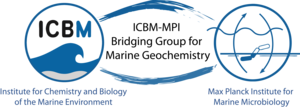Group leader

Prof. Dr. Thorsten Dittmar
ICBM Oldenburg / MPI Bremen
Tel.: +49-(0)441-798-3602
Fax: +49-(0)441-798-3358
E-Mail: thorsten.dittmar@uol.de
Location:
University of Oldenburg, Campus Wechloy
Room: W03 1-218A
Carl-von-Ossietzky-Straße 9-11
26129 Oldenburg
Location/Directions
Marine Geochemistry (ICBM-MPI Bridging Group)

Background
The research group for Marine Geochemistry was established in 2008 as a scientific bridge between the Institute for Chemistry and Biology of the Marine Environment (ICBM) at the University of Oldenburg and MPI Bremen. To this end, the Max Planck Society and the University of Oldenburg have signed a formal cooperation agreement.

Research
With our research we aim to answer a long-standing research question in marine biogeochemistry that is fundamental to our understanding of how organic carbon pools form and change over millennia: Why has non-living, dissolved organic matter accumulated in the ocean and formed one of the largest organic carbon pools on Earth’s surface?
With 700 Pg of carbon, marine dissolved organic matter (DOM) stores more carbon than all living biomass on Earth combined. However, the controls behind the persistence and the spatial patterns of DOM concentrations on basin scale remain largely unknown, precluding quantitative assessments of the fate of this large carbon pool in a changing global climate. Net removal rates of DOM along the overturning circulation suggest lifetimes of millennia. These net removal rates are in stark contrast to the turnover times of days to weeks of heterotrophic microorganisms, which are the main consumers of DOM in the ocean. A main challenge to understand the accumulation of DOM is not only the close interconnectedness of scales, but also the inherent transdisciplinarity of the topic, bridging between geochemistry, microbiology, ecology, oceanography and large-scale modelling. In the following, we highlight examples of our research over the past three years in the areas of analytical method development, marine biogeochemistry, and global biogeochemical modelling.

![[Translate to English:]](/f/5/_processed_/3/2/csm_ICBM-Logo-transparent-_91fe1c6774.png)

